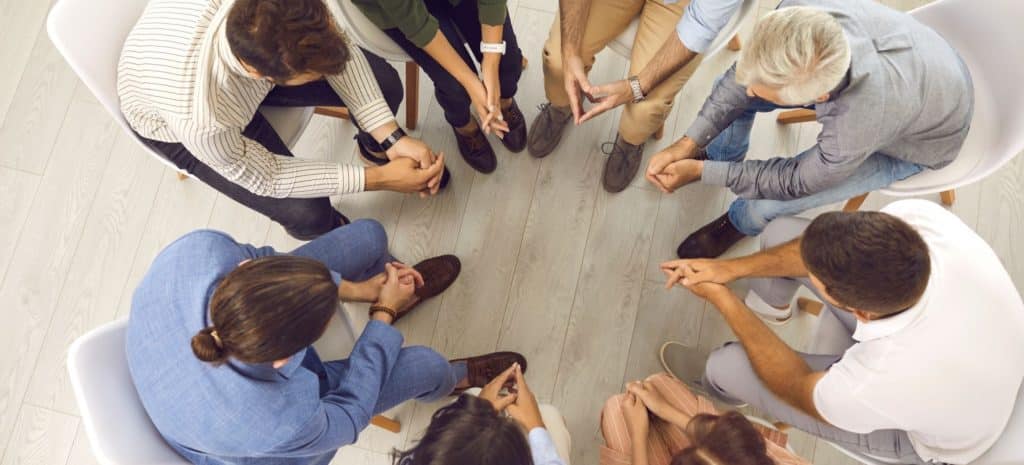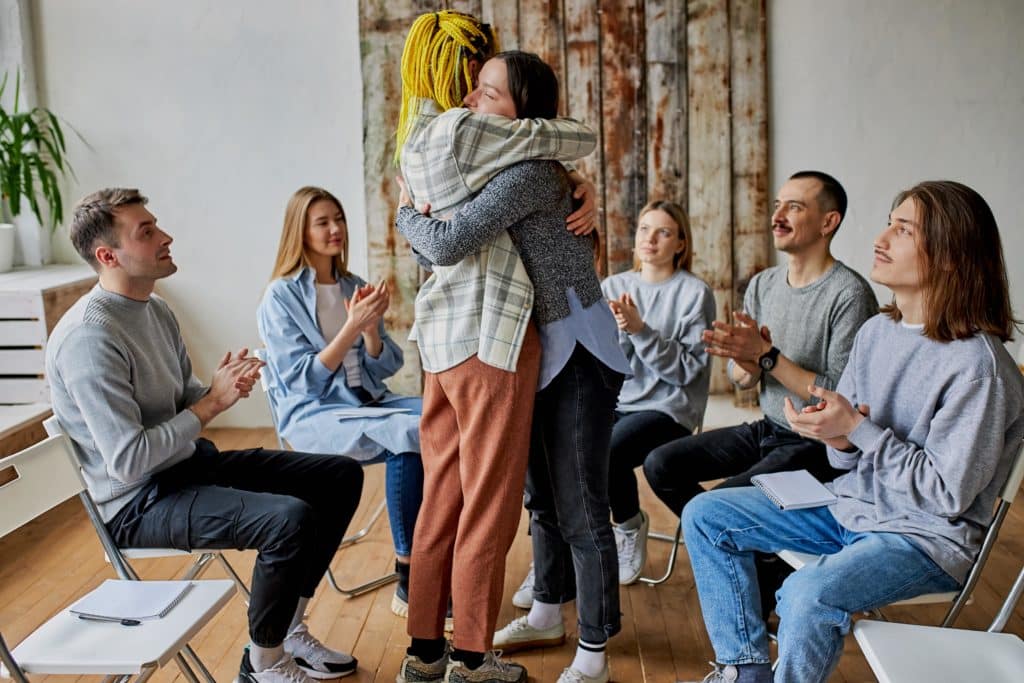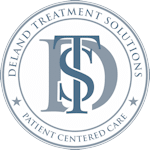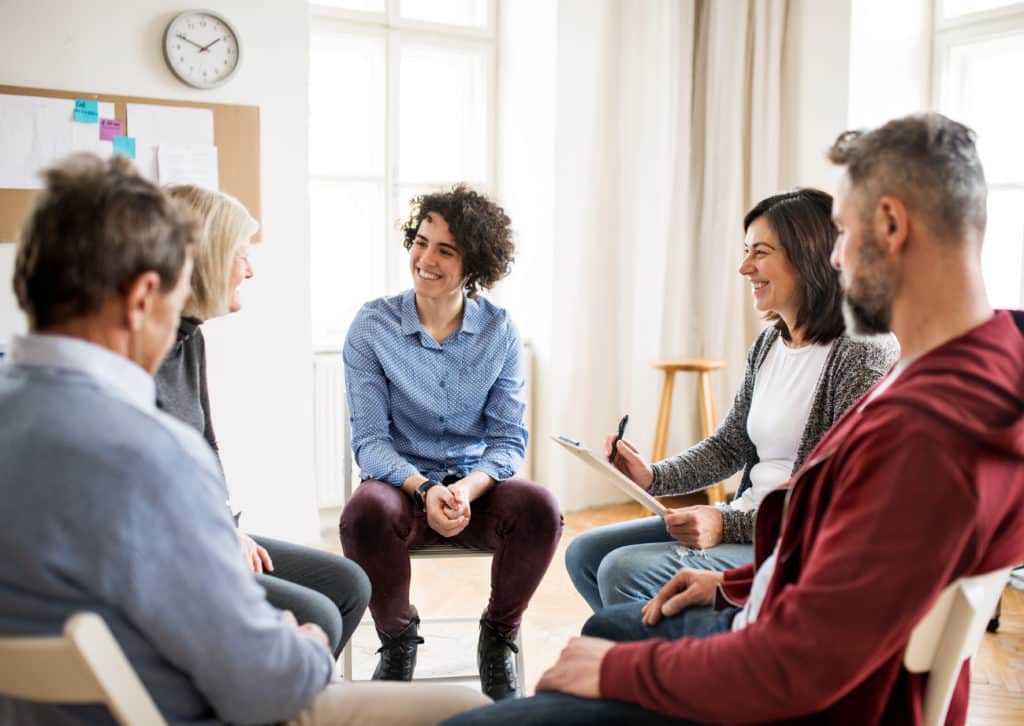Studies conducted show that 21% of adults in the United States experienced some form of mental illness in 2020 (52.9 million people). Out of those 50 million individuals, only 46.2% received treatment. While needing help is in high demand, not everyone can receive or access the necessary resources to break the cycle of addiction.
At Deland Treatment Solutions, addiction therapy sessions and other forms of recovery meetings and support groups are integrated into our comprehensive treatment plans to help people recover and achieve long-term sobriety.
What Is Group Therapy?

Group therapy for substance abuse is a form of psychotherapy that involves one or more therapists working with several people at the same time. Group therapy is usually led by a trained group therapist, and it can be an effective treatment for a wide variety of mental health issues, including addiction.
How Was Group Therapy for Substance Abuse Created?
Group therapy for substance abuse was created in the 1930s by Alcoholics Anonymous (AA), a group of men who were trying to quit drinking. AA is still active today, and it has helped millions of people around the world recover from alcoholism.
Who Is Most Likely to Benefit From Group Therapy?
You’re most likely to benefit from group therapy if you’re struggling with addiction, depression, anxiety, or any other mental health issue that causes you distress.
How Is Psychotherapy Used in Addiction Treatment?
Psychotherapy is used in addiction treatment to help people understand the thoughts and emotions that are associated with their addiction. This type of therapy can also help people to learn new coping skills and ways of thinking about their addiction.
Mental health disorders and addiction often go hand-in-hand. About half of all people with a substance use disorder also have a mental health disorder. This is called a co-occurring disorder.
If you have a co-occurring disorder, you will need to treat both the addiction and the mental health disorder at the same time. This is called dual diagnosis treatment. Dual diagnosis treatment can be done in an outpatient or inpatient setting, depending on the severity of your disorder.
How Can Group Therapy Help Treat Addiction?
Group therapy can provide support and guidance from others who are struggling with similar issues. It can also help people learn new coping skills and healthy ways of dealing with their addiction.
What Are Some Benefits of Group Therapy?
Some benefits of group therapy include:
- A safe place to share your story and feelings without judgment
- Improved self-esteem and confidence
- A sense of belonging and connection
- Support and encouragement from others
- Opportunities to practice new skills
If you are struggling with addiction, group therapy may be a good option for you. It can provide much-needed support and guidance from others who understand what you are going through. It can also help you learn new coping skills and healthy ways of dealing with your addiction.
If you are interested in group therapy, please speak to your doctor or therapist. They will be able to help you find a group that is right for you.
The Different Forms of Group Therapy
The different forms of group therapy are as follows:
- Cognitive behavioral therapy (CBT): This type of group therapy helps people to identify and change the thought patterns and behaviors that contribute to their addiction.
- Interpersonal group therapy: This type of group therapy focuses on helping people to improve their relationships with others.
- Support group: This type of group therapy provides support and guidance from others who are struggling with addiction. It can be helpful to talk to others who understand what you are going through.
- Skills training group: This type of group therapy focuses on teaching people new skills to help them cope with their addiction. Skills such as relaxation techniques, stress management, and problem-solving may be taught in this type of group.
What to Expect From Group Therapy?
If you are considering group therapy, it is important to know what to expect.
First, group therapy usually lasts for a set amount of time, such as 8-10 weeks. During this time, you will meet with the group regularly, typically once per week.
Second, group therapy is usually confidential, which means that what is said in the group stays in the group. This provides a safe space for people to share their thoughts and feelings without fear of judgment.
Third, group therapy is usually led by a trained therapist who will facilitate the group discussion. The therapist will also provide guidance and support to group members.
Fourth, group therapy typically involves 10-12 people who are all struggling with similar issues. This allows group members to relate to one another and offer support and encouragement.
Finally, group therapy typically focuses on improving interpersonal relationships and communication skills. This can be beneficial for people who struggle with substance abuse, as they often have difficulty communicating their needs and feelings.
If you are struggling with substance abuse, group therapy may be a helpful treatment option for you.
What Activities Can I Expect During Group Therapy for Substance Abuse?
The activities that take place during group therapy for substance abuse will vary depending on the type of group.
However, there are some common activities in most groups. These include:
- Sharing your thoughts and experiences with others in the group
- Listening to others share their thoughts and experiences
- Discussing group topics and sharing ideas
- Participating in group activities or exercises
What Should a Person Expect in a Group Counseling Session?
During group therapy, a person should expect to share their story with the group and to hear the stories of others. The group will provide support and guidance as you work through your addiction. Group therapy can be a powerful experience, and it can help you to see that you are not alone in your struggle.
If you are considering group therapy for addiction, it is important to find a group that is specific to your needs. There are many different types of group therapy, and not all groups will be right for every person. Some group therapy options include:
– 12-step programs: These groups follow the 12 steps of recovery laid out by Alcoholics Anonymous. There are groups for many different types of addiction, including Alcoholics Anonymous, Narcotics Anonymous, and Al-Anon (for family and friends of addicts).
– Support groups: These groups provide a safe and supportive space for you to share your experiences and feelings. They can help provide social support, but they do not usually focus on changing addictive behaviors.
No matter what type of group you choose, it is important to find one that feels safe and comfortable for you. Group therapy can be a great way to get support and understanding from others who are going through similar experiences. It can also help you to learn new skills and ways of coping with your addiction.
How to Develop Relationships in Group Therapy for Substance Abuse
Developing relationships is one of the most important aspects of group therapy for substance abuse. It is essential to feel safe and supported by other group members to get the most out of group therapy.
The first step in developing relationships is to be open and honest with group members. This means sharing your thoughts and feelings honestly, without judgment or criticism. It is also important to listen to what others have to say without judgment or criticism.
Another important aspect of developing relationships is respect. This means respecting each other’s opinions and experiences, even if you don’t agree with them. It is also important to respect each other’s boundaries and personal space.
Finally, it is important to work together as a group. This means cooperating and working towards common goals. It is also important to support each other, especially when someone is struggling.
Developing these relationships takes time and effort, but it is worth it. Group therapy can be a very powerful tool for recovery, and these relationships are key to making it successful.
How Effective Is Group Therapy?
Group therapy is effective for a variety of mental health conditions. In general, group therapy is as effective as individual therapy.
For some conditions, group therapy may even be more effective than individual therapy. This is especially true for conditions that are based on relationships, such as social anxiety disorder and borderline personality disorder.
Group therapy is also generally more cost-effective than individual therapy. This is because group therapy usually costs less per person than individual therapy.

What If Group Therapy for Substance Abuse Is Not for Me?
If group therapy is not something you feel comfortable with, there are other therapy options available. Treatments will vary as everyone struggling has their own set of unique needs. It’s wise to speak to your doctor or therapist about other treatment options that may be more suitable for you. Your options outside of group therapy include:
- Individual therapy
- Family therapy
- Cognitive-behavioral therapy (CBT)
- Medication-assisted treatment (MAT)
There is no one right answer for everyone when it comes to group therapy for substance abuse. The most important thing is that you find a treatment option that works for you and that you feel comfortable with. If group therapy is not the right fit for you, there are other options available.
Receive the Help You Need at DTS
Deland Treatment Solutions offers group therapy for substance abuse as part of our comprehensive treatment programs. Our group therapy sessions are led by experienced and licensed therapists who specialize in treating substance abuse.
If you are struggling with substance abuse, please contact us today to learn more about our group therapy program. We can help you overcome your addiction and start living a healthy and happy life.
Contact Us
CALL US NOW
DeLand Treatment Solutions will iron out the details for you in a manner that will make you confident in your path to sobriety. That first simple call is your ticket to making DeLand Treatment Solutions your solution for addiction. Get the freedom from addiction that you deserve today.
Call Us Now (386) 866-8689
Years of experience
Our leadership team has extensive experience in dual-diagnosis treatment and is ready to help those who are struggling with substance use and mental health.

Specialists
Our staff consists of many licensed mental health treatment facilitators and other staff who are ready to share their experience and their success.

Happy patients
Deland Treatment Solutions has helped over 2,000 people who have struggled with mental health problems find freedom to normal and healthy life.
Contact Us
GET IN TOUCH
Reaching out to Deland Treatment Solutions may be the most important call of your recovery process. A caring professional is waiting for your call to be your guide to addiction-free living.
Need Help? Contact Us
Reference
 info@shc.health
info@shc.health 
